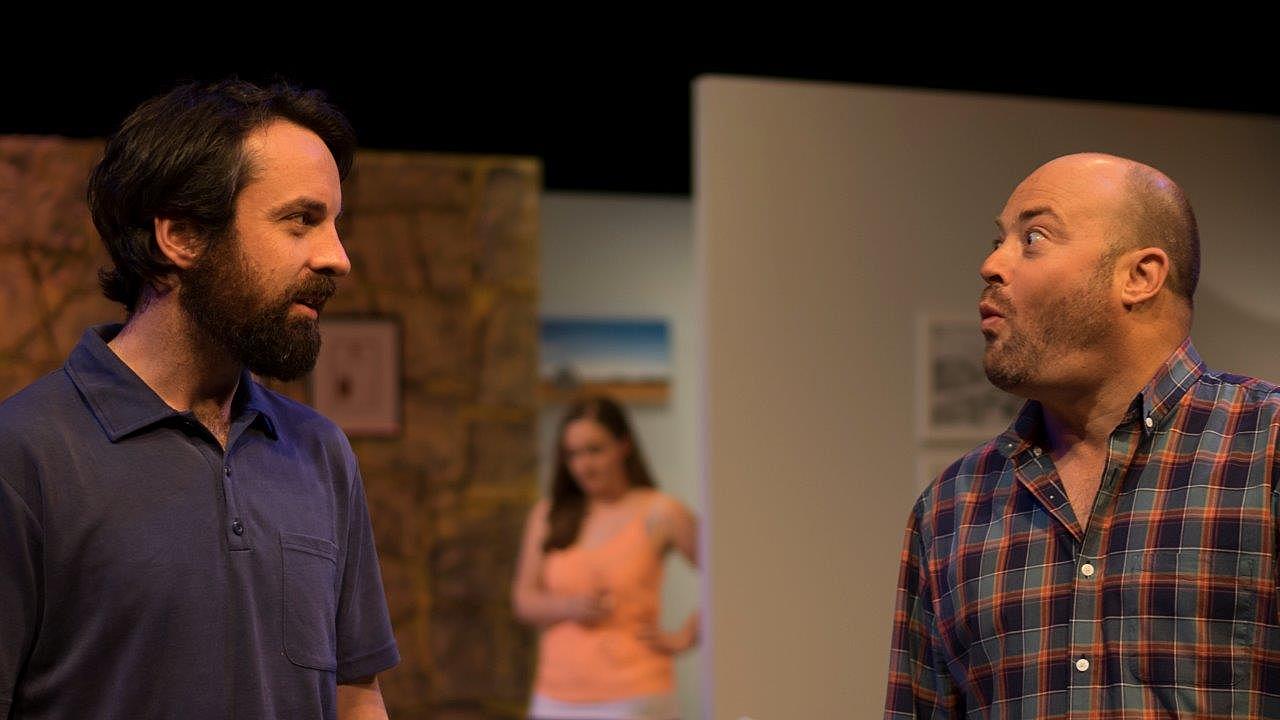Review: Central
Dave Armstrong, one of our country's most popular and respected playwrights, takes aim at New Zealand's rampant inequality and our inability to take care of the environment in his latest play. But has he bitten off more than he can chew? Adam Goodall reviews Central, now playing at Circa Theatre.
Dave Armstrong, one of our country's most popular and respected playwrights, takes aim at New Zealand's rampant inequality and our inability to take care of the environment in his latest play. But has he bitten off more than he can chew? Adam Goodall reviews Central, now playing at Circa Theatre.
Michael, a very wealthy screenwriter of soulless Hollywood tentpoles, swaggers into the room with a bottle of wine in one hand and two glasses in the other. He’s rabbiting on about some rich-lister shit, some business decision he has to make. It’s a small moment in Central, but I’m overcome by a powerful sense of deja vu, like this is something I’ve seen before, in a hundred other comedies of this style – especially New Zealand comedies, and especially New Zealand comedies on our professional stages. Got a one-percenter in your dramatis personae and want everyone to think they’re up their own arse? Swagger, wine, rich-lister shit. Tick, tick, tick.
It’s easy shorthand, especially post-John Key and his magnum of Moët. In one of those harmless New Zealand comedies, the ones with more modest ambitions, this moment wouldn’t pass with any more than a groan. Central’s ambitions aren’t modest, though. Written by Dave Armstrong, one of the country’s most popular playwrights, Central takes aim at some of the most pressing political issues our country faces: inequality, the housing crisis, our fragile environment. It’s trying to do more than some gormless, uninspired upstairs-downstairs routine.
That’s why this easy shorthand feels like nails on a chalkboard.
Central opens on, and stays with, a dreary rock-and-plaster McMansion overlooking a Central Otago vineyard. (The set is designed by Daniel Williams, one of the most interesting and accomplished professional set designers working in New Zealand, but even he struggles to find the shade in Wanaka’s prefab modernism.) Michael (Tom Trevella) owns the vineyard; he lives there with his partner Cherie (Claire Waldron), a faded Hollywood starlet, refugees from the LA rat race. They’ve been working on a script together – an “artsy”, small-scale passion project about a widower going mad in a valley, to star Cherie and be directed by Michael. But, of course, Hollywood comes calling: Michael’s asked to rewrite the shitty sequel to Pimp Action, a shitty blockbuster he also bears responsibility for. And they’re offering a lot of money.
That’s money that could go towards paying Brian (Alex Greig), the local tradie fixing the deck; it could also pay Karen (Harriet Prebble), who somehow finds time between nannying and working hospo in Queenstown to clean the McMansion. Armstrong wastes no time setting up this dynamic so that he can slug away at softballs, poking gentle fun at the cultural gulf between the rich and the working class. He occasionally hits a home run with this material, finding bitterness and exploitation in some surprising places. For example, Brian tells Michael how much he and his son love Pimp Action, telling Michael about how his son’s got it on his computer: “He’s got this programme that means he can watch any movie for free! He’s a smart lad.”
Too often, though, Central’s comfortable with the shorthand. Armstrong’s at his most anemic when he throws Brian and Michael together. Michael drinks pilsners but Brian drinks Speights! Brian likes action movies but Michael hates them! Michael has a Colin McCahon but Brian jokes, “Isn’t he the bloke who ruined all his paintings by writing on them?!”
That’s unfortunate, because this is well-tilled ground for Armstrong. There’s The Tutor, his 2006 play about a brash wheeler and dealer who hires a politically-correct teacher to ram his obnoxious slacker son through NCEA. There’s Le Sud, in which a cash-strapped North Island tries to negotiate a deal with well-off French-led South Island that could save their economy. There’s The Motor Camp, which threw a whiny family of educators into a run-down motor camp with a chill blue-collar couple and their son. One of the educators in that summer matinee hit was even writing a book. If there’s anything Armstrong should be an expert in, it’s finding new ways to laugh at and satirise the socioeconomic divisions in our country, but his chalk-and-cheese set-ups lack teeth and director Conrad Newport and his cast don’t work too hard to find any.
If there’s anything Armstrong should be an expert in, it’s finding new ways to laugh at and satirise the socioeconomic divisions in our country, but his chalk-and-cheese set-ups lack teeth and director Conrad Newport and his cast don’t work too hard to find any.
Trevella and Greig play Michael and Brian as two sides of the same coin. Brian’s a bundle of redneck traits, constantly nodding and projecting his voice like there’s a wind roaring past him. A loud and uncouth man who pronounces Pukaki with a thick Pākehā accent and clamps wine glasses over his nose like a horse with a feedbag, Michael’s not too dissimilar. One’s a blue-collar stereotype; the other’s a stereotype of new money, someone who would’ve been a blue-collar stereotype but for the grace of God (this extends to the way Armstrong depicts Michael’s chosen trade, screenwriting, as a loveless occupation, all negotiation, notarisation and blunt force typing). They’re both broadly-drawn and broadly-performed, cartoons of people.
Waldron resists this characterisation a bit more. Cherie is a squirmy, painfully insecure woman who is conscious of her status as a has-been; she may be rich, but she’s acutely aware of her lack of real power. At her best, Waldron’s interrupting the flow of scenes, stumbling over her words and fully trusting anyone who’s ever said a kind word to her, preoccupied with finding a place she can exist – and people she can exist with – without feeling like she’s constantly being scrutinised. Prebble takes a more straight-forward approach with Karen, playing a toned-down version of Greig’s rustic spirit, but while that choice means she gives a steadier performance than Waldron, consistently charming and unpretentious, it also means that she finds little in Karen that’s exciting or unexpected.
This is why it’s so surprising when Central catches the smell of hot-button issues and grows some fangs. Armstrong’s always had a deep interest in the politics of our country, reflected in his work as a playwright, as a screenwriter, and as a snarky pundit for the Dominion Post with a withering view of right-wing ideology. That’s also reflected in Central: he’s well-versed in the talking points surrounding our country’s rampant inequality and its twin environmental and housing crises. His dialogue canvasses the dangers of sprawl, the instability of being working class in a bubble economy, the impact of monocultures on fragile ecosystems, and the cast seize the opportunity these meaty, issue-laden arguments present. Their broad voices get sharper and their tone drips with venom, protecting their turf without full-knowledge of, or care for, the other person’s position.
The sudden shift in quality is so huge during these moments, it’s like we’ve stepped into a different show. Armstrong’s dialogue is more memorable, his intentions are more crystal, and his sense of how economic power shapes and warps people’s priorities and attitudes toward the world around them is more recognisable, more real. He still trips up here and there when he gives into the temptation of caricature – Michael’s bolshiness and hypocrisy runs the risk of taking genuine environmental concerns down with it – but his writing’s so much more adrenalised and so much more aggressive in trying to get us to listen that it almost doesn’t matter. When Brian talks about his blue-collar mates earlier on, it’s white noise; when he stares down Michael’s blathering about affordable housing in Arrowtown and spits back, “Your ‘no-one’ is not my no-one,” you fucking feel it.
These are moments, though, make no mistake. Central’s so preoccupied with its sub-Altman satire of upper-class self-absorption that its energetic, complex, socially-engaged content only gets a few minutes in the first half and a chunk of the last fifteen minutes as Armstrong starts tying all the threads together. These scenes are also concentrated on Brian and Michael in a way that betrays so much of what the play’s trying to say, about Hollywood, about inequality, even about its characters.
That’s not to say Karen and Cherie don’t have stories, even if they are pushed to the sidelines during the arguments about the state of our nation. They are players, however active, in the main movie-making plot, driven by their own motivations. But Central’s more interested in using them as markers in the sand, survey points for mapping Michael’s fall. Armstrong has little new or interesting to say about the movie-making business, painting in broad strokes – a meddling producer here, a movie with no soul there. This broad-strokes commentary extends to the lack of respect Cherie’s been extended as an actress. But, in a bitter irony, her story’s a footnote to the men around her: by the end, we don’t know much about her beyond the movie she starred in with Brad Pitt and the child she wants to have with Michael. Then there’s Karen’s arc, which doesn’t so much complicate what Central has to say about inequality as it does actively undermine those things it says.
From the endangered bug encased in sap on Michael’s coffee table – to Michael, a reminder of how property developers have ruined pristine New Zealand ecosystems – to the subplots all tied up at the end, Central keeps coming back to this idea of how we take the kernels of beauty and goodness in our lives and bury them, under selfishness, ignorance and fat stacks of cash. Grimly, though, the best illustration of this idea is the play itself. Competently-directed and occasionally entertaining, Central bellows at us to think about the ways that our country’s problems – our planet’s problems – intersect with and complicate each other, preventing easy answers. But those bellows are fitful and muffled, killed by all those brainless culture clashes and buried by that nonsense about the dull screenwriter and his unhealthy relationship with those vampires in Hollywood.
Central runs at
Circa Theatre, Wellington
from Saturday 15 October to Saturday 12 November
For tickets to and more information about Central, go here.

